It’s been 4 years since the COVID pandemic. During that time, we’ve seen the incredible rise of remote work, followed by a decline as companies began forcing (or threatening) their workers to return to the office.
But what has happened in the past year? Is remote work on a gradual decline? Or is it here to stay? I decided to analyze 1M remote job openings in the past 2 years to find out.
Here’s what I analyzed:
- How the % of remote job postings is trending in the past year
- What types of jobs are most likely to be remote
- Whether leadership jobs are more/less likely to be remote vs individual contributors
- How salaries for remote jobs compare to non-remote jobs
- Which countries are the most popular for remote work, and which has had the highest growth?
- Are remote jobs moving to other countries outside the US?
- Do companies with a remote work culture have a higher work satisfaction?
Note: The job postings were provided by Revealera.com, a company that provides job postings and hiring trends data to financial institutions. These jobs were a mix of jobs from huge public companies as well as small startups from all types of industries, and countries globally.
The share of remote job postings is up 10% from a year ago, and up 31% from 6 months ago, after a steady decline since mid-2022
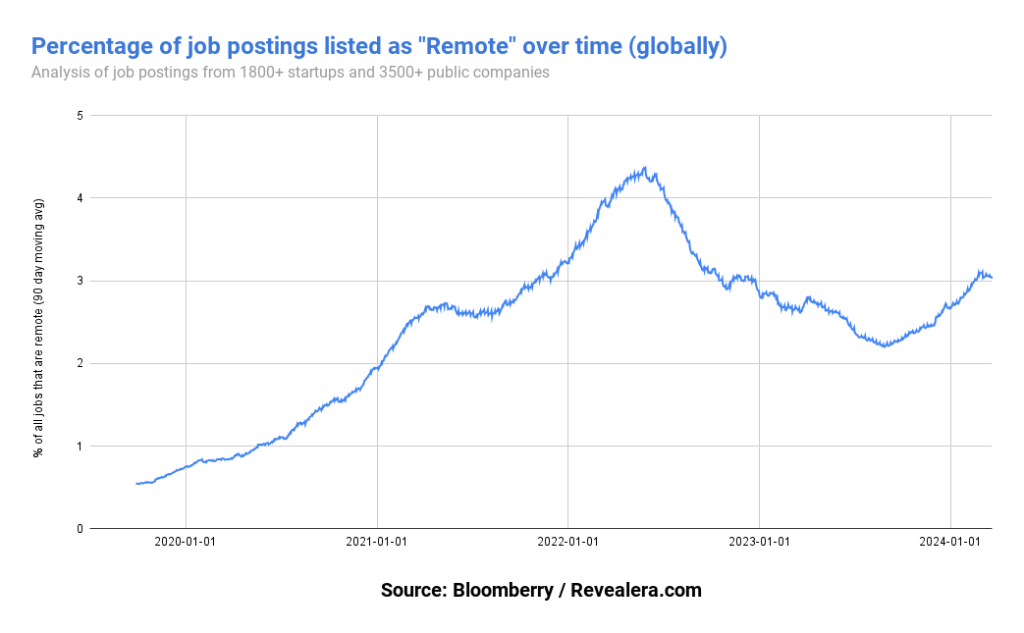
After a steady decline since early 2022, the % share of remote jobs is starting to rise again. The % of global job postings listed as remote is up 10% from a year ago and 31% from 6 months ago. Interestingly, the share of remote jobs has increased even more in public companies than in startups.
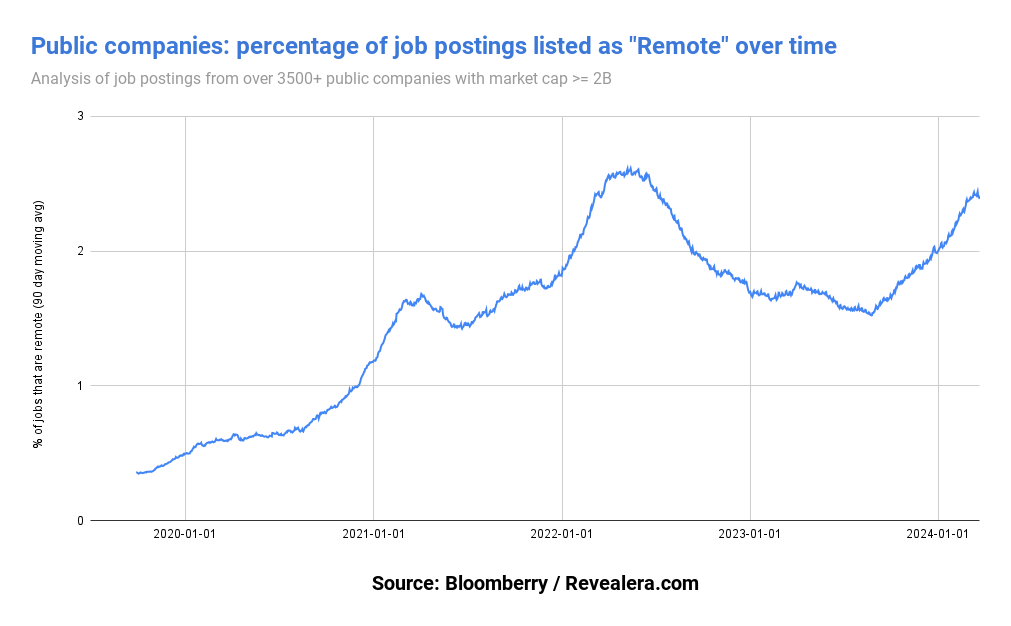
The share of remote job postings for public companies rose 45% from a year ago, and is almost at its all-time high in early 2022. In contrast, for startups, the share rose just 9.8% from a year ago.
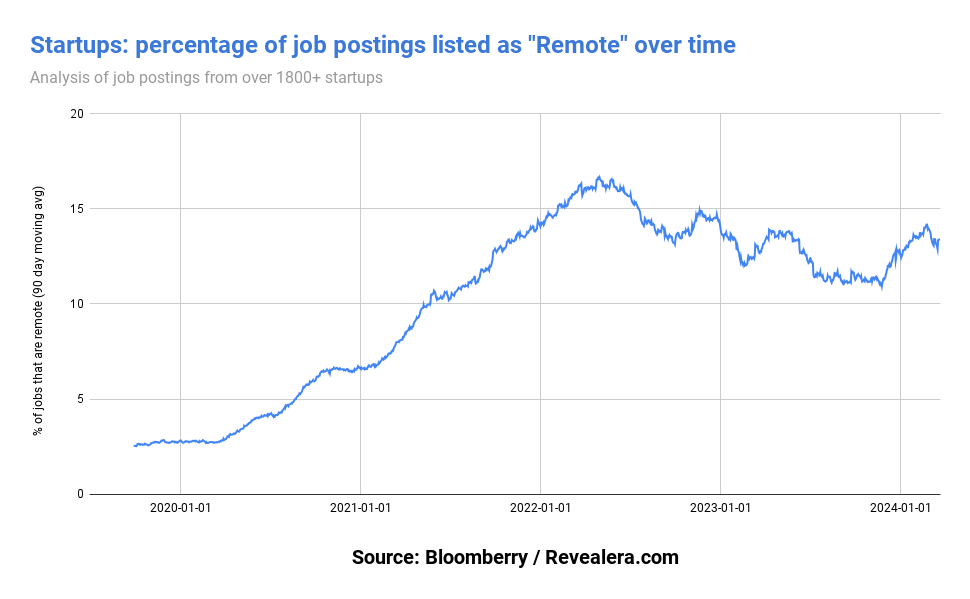
It’s important to note that I’m looking at % of jobs that are remote, *not* raw numbers. The raw # of remote job openings have decreased from a year ago but that isn’t because companies are moving away from remote work, but because of tech layoffs that are happening across the board.
But still, why the recent increase percentage-wise? I don’t have definitive reasons, but for starters, I think a lot of return to office initiatives are finally over.
Second, companies are focused on cutting costs as much as possible. They’re looking for ways to save costs on real estate, and labor. And remote work helps with that. It opens up the talent pool by allowing companies to find talent in places with a lower cost of labor. After all, why hire that developer in SF who demands $250K, when you can hire someone just as capable in Michigan for $200K?
Unless there is another pandemic, we probably won’t be seeing a huge steep rise in remote jobs. But it seems most of the RTO initiatives has passed, and we may be seeing a “new normal” and the start of a slow secular increase in remote work.
Account executives, software engineers and digital marketers are the top 3 most popular remote jobs
Which job titles have the most popular remote jobs?
If we look at just pure volume, account executives/managers, software engineers and digital marketers make up the vast majority of remote job openings.
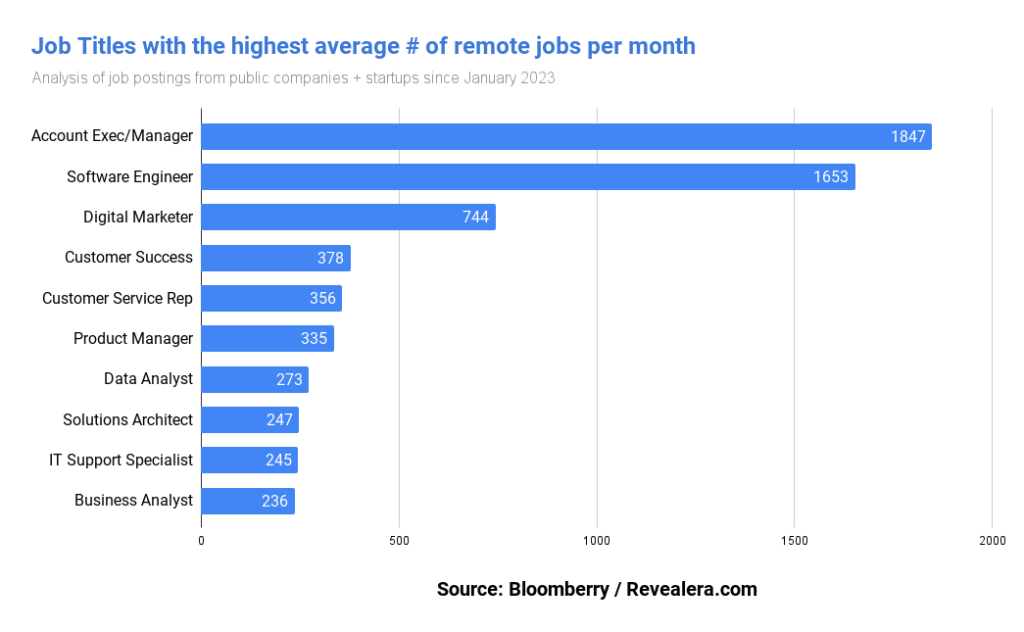
However, I think a more interesting analysis would be which jobs are *more likely* to be more remote-based. For this exercise, I took the total # of jobs listed for each job title, and calculated the % that were remote.
If we calculated this way, technical writers, customer success specialists and product designers are the most likely jobs to be remote.
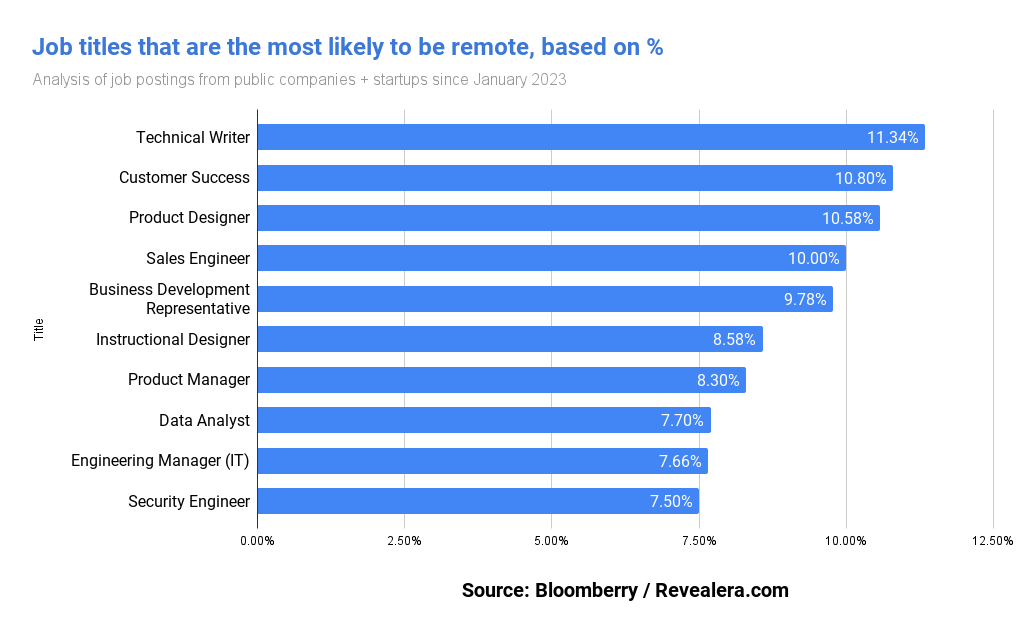
Director, VP and Management job openings are more likely to be remote than Individual Contributors
This was the most surprising finding. 5.4% of all white collar job postings in the VP and Director level from public companies were remote, while only 3% of individual contributor (non-management) job postings were remote.
This was a bit counterintuitive to me because I always thought specialized roles were more conducive to being remote, while senior leadership roles typically involve a significant amount of communication, which usually benefit from in-person interactions.
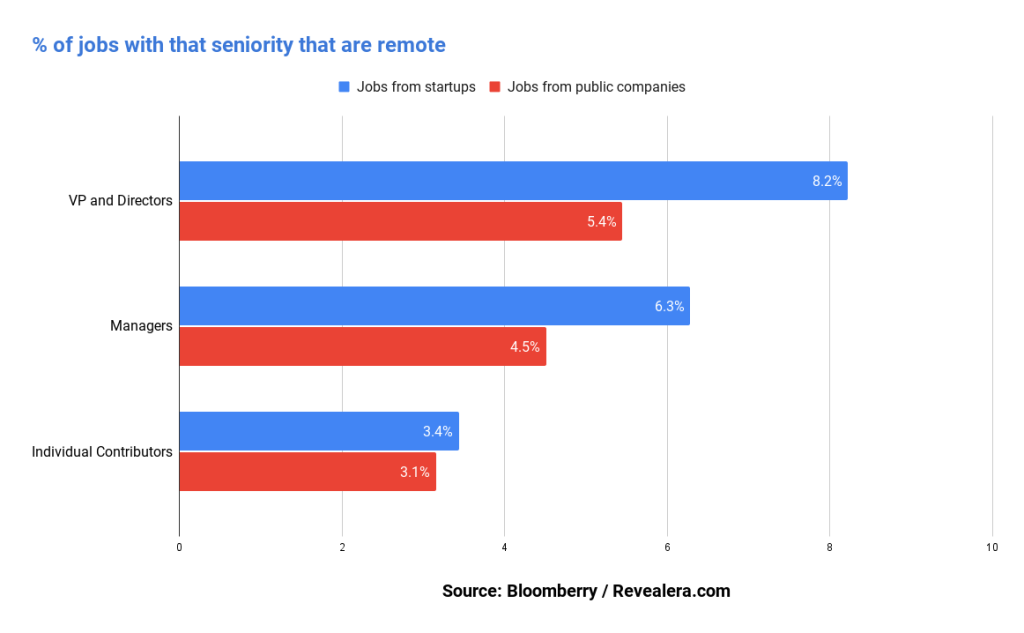
Remote jobs also require a bit more experience than non-remote jobs. The average # of years of experienced required in remote jobs was 5.3, a bit more than the 4.3 years of experience required for non-remote jobs (with the same job title).
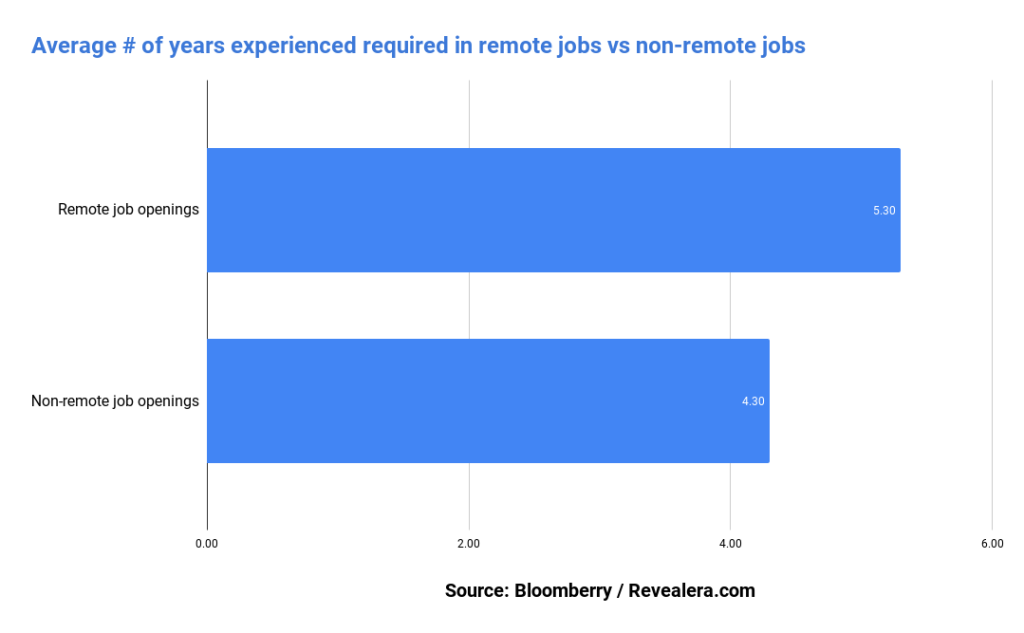
Among all the different levels, entry-level jobs were the least likely to be remote at 2.48%, while senior-level jobs were the most likely at 5.35%.
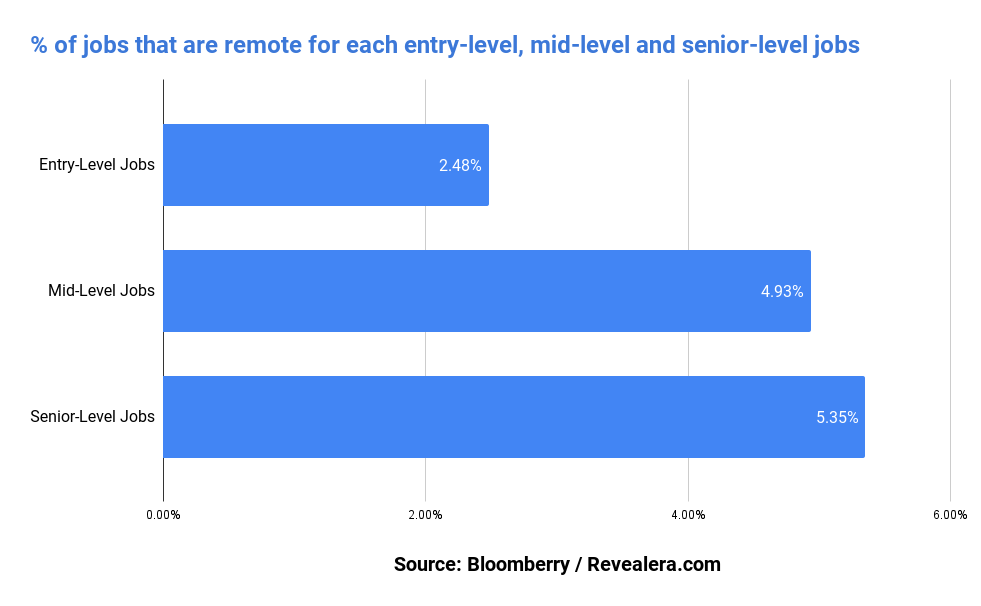
Putting all this data together, I think the story here is that companies simply require an enormous amount of trust in hiring someone to work remotely, and as a result, they’re more likely to give a remote job to senior leaders and people with lots of experience.
I think there’s also something to be said here for preferences based on what generation you’re in as well. Gen Z prefer working in the office, and the benefits it brings such as networking, mentorship and a structured environment. While older workers may have families and kids to take care and prefer working remotely.
Preferences for remote work depends on the profession and industry
Preferences for remote work also differ, depending on what profession and industry you’re in. I conducted a poll on Blind, a tech community mostly frequented by software engineers, and 66% of them told me they would prefer to work remotely 5 days a week.
I conducted the same poll to my Twitter audience (the vast majority of whom are in the financial/investment industry), and only 36% of them chose 5 days a week. 27% of them even would prefer working remotely just 1-2 days a week. A huge difference.
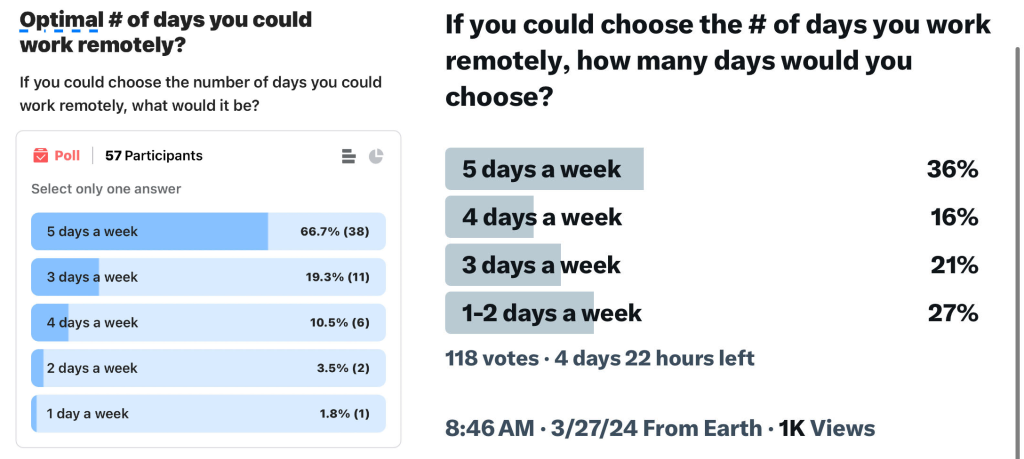
I think these poll results underscore the cultural differences between the tech and financial sectors, and the importance of culture fit when recruiting.
Someone who has all the credentials and experience, but has mostly worked in tech companies might not fit in a company like JPMorgan or Goldman Sachs, where employees not only are expected to work most days in the office, but *want* to be in the office.
Salaries for remote job openings are essentially the same as average salaries for non-remote job openings
Do remote workers earn less than their non-remote counterparts? According to the data, the answer is no. Salaries for remote jobs are essentially the same as salaries for non-remote jobs, when controlling for years of experience and job titles.
Here’s what I did to find the answer: I took the 50 most popular job titles in remote job postings, and for each job title, calculated the average midpoint in salary ranges of all remote jobs with that job title since Jan 1, 2023 , and compared it to the average midpoint in salary ranges of all non-remote jobs with the same criteria.
On average, among all 50 job titles, the average salary for non-remote job postings was 0.6% higher than remote job postings (which is essentially 0, if we account for a margin of error).
How does this reconcile with conflicting studies that say remote workers get paid less than in-office workers? I think there’s several things to point out. One is that those other studies don’t control for job titles. They’re comparing apples to oranges. They’re comparing all jobs that are remote with all jobs that are hybrid/in-office, even though the mix for both of them are not the same. Whereas I tried to compare apples and apples, by comparing salary ranges in remote jobs vs non-remote jobs with the same job title and years of experience.
However, I will caveat by saying that there might be a bias in play here. For instance, it might be that companies that have a remote-work culture might simply pay more in general than companies that don’t have a friendly remote work culture. This could be because they’re more likely to be tech or upscale companies. So it might make more sense that remote jobs pay more than non-remote jobs, even for the same job title.
Ukraine, Brazil and Poland have the highest % of white-collar jobs that are remote. France, Germany and India had the lowest
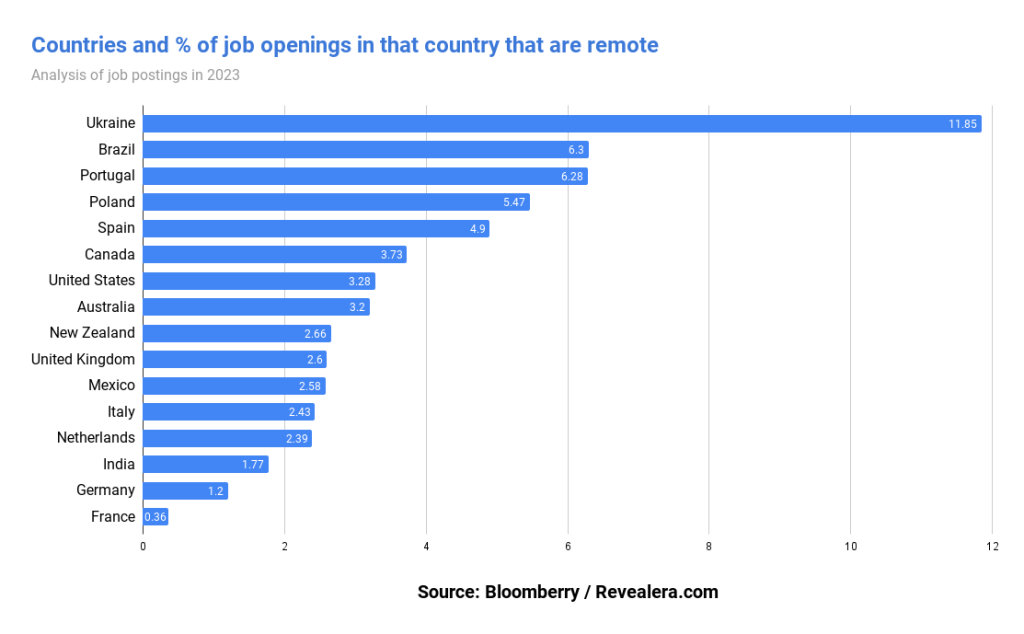
Which countries lead the way when it comes to remote work? Among countries with at least 1000 remote job openings last year, Ukraine, Brazil and Poland led the way. On the other hand, Australia, India and France were among the countries with the lowest % of remote job openings. I thought it would be interesting to compare this with the best countries for remote work published by Remote.com. The 2 countries that made it to the top 5 in both lists were Spain and Portugal.
Compared to 2022, there really wasn’t much of a difference. But the countries with the largest growth in % of remote job openings were New Zealand, Portugal and Spain. Countries with the largest decline in % remote jobs were Poland, Canada and Italy.
Remote Jobs from US Companies have mostly stayed inside the US
Are US companies hiring more remote workers from overseas? I measured the % of remote jobs from US-based companies that are based inside the US, and the % has remained steady at 75% since 2020.
While globalization is a significant force, for remote work, there’s still a strong inclination towards hiring within the national borders, potentially for reasons of legal compliance, logistical simplicity, and workforce management.
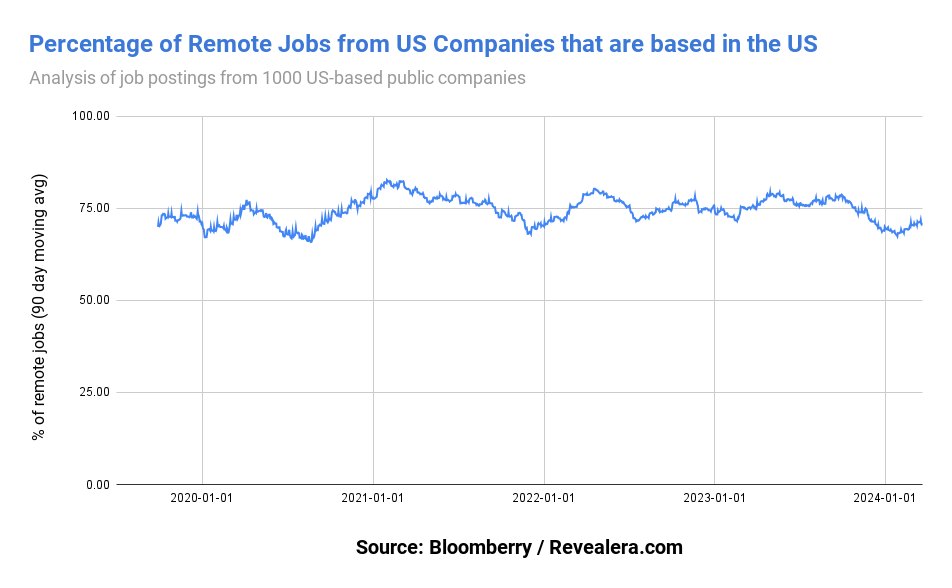
This trend is pretty consistent, no matter what type of jobs I looked at, whether it was software engineering or customer service.
Companies with a mostly remote work culture had an average Glassdoor rating of 3.8 vs 3.4 for the average company
Does remote work correlate strongly with work satisfaction? I analyzed 100 companies with the highest % of remote jobs overall, and their average Glassdoor rating was 3.8, which is higher than the average Glassdoor rating of 3.4 for all companies.
Correlation isn’t causation, and of course compensation, benefits and work-life balance all matters, but this does suggest a strong relationship between having a remote work culture and work satisfaction.
Unfortunately, I wasn’t able to pick out companies that had a hybrid work policy easily, but it would’ve been interesting to see if fully remote companies had higher satisfaction ratings than companies with hybrid work policies.
Summary and Conclusion
I think it’s safe to say from that data that remote work is far from dead. In fact, I wouldn’t be surprised to see the share of remote jobs increase even more in the next year or so, as the job market slowly reverses from being just an employer’s market.
Here’s a summary of my findings:
- % of remote jobs have started increasing since mid-2022, and is up 10% year over year.
- Senior leadership jobs are more likely to be remote than individual contributors
- Remote jobs require more experience than non-remote jobs
- Entry-level jobs have the lowest % of remote jobs compared to mid-level and senior-level jobs
- Average salaries for remote jobs are essentially the same as salaries for non-remote jobs
- US-based companies have continued hiring remote workers within the US rather than abroad
- Companies with a remote work culture have a higher Glassdoor rating than the average company
Subscribe to get more data-driven research on hiring, labor and AI trends
Future articles will include: outsourcing trends, our best attempt to use data to find out which careers are least likely to be replaced by AI, and more! No fluff, no armchair predictions, just refreshing research backed by DATA
Methodology (the boring stuff)
I analyzed job openings from a mix of ~3500 public companies and 1800 startups for this study. To determine if a job was remote, I simply looked for the work ‘remote’ (and it’s foreign equivalents) in the location field. I also tried to exclude jobs that mentioned Hybrid anywhere in the location field, or mentioned ‘hybrid’ in the job description to try and exclude hybrid jobs. Countries were also determined from the location field, so a job that listed as “UK-Remote” or “London Remote” was determined to be a job that was targeted to workers to that country.
Job titles were normalized using a machine learning algorithm I developed to convert a job title/description into its normalized form (ie. UX Developer => Software Engineer).
Average salaries was determined by taking the average min + max of all job postings and taking the midpoint.






